The Ultra-Low Temperature Freezers Market is estimated to be valued at USD 495.2 million in 2025 and is projected to reach USD 830.0 million by 2035, registering a compound annual growth rate (CAGR) of 5.3% over the forecast period. The market’s growth curve displays a consistent upward trend, with incremental increases year over year. From 2025 to 2030, the market increases by USD 53.9 million, moving from USD 495.2 million to USD 549.1 million.
This steady growth reflects the initial stage of adoption, driven by increasing demand from sectors like pharmaceuticals, biotechnology, and medical research. The average annual growth during this period is approximately USD 10.8 million. In the subsequent period (2030–2035), the market experiences a more significant rise, adding USD 280.9 million as it expands from USD 549.1 million to USD 830.0 million.
This portion of the curve demonstrates a more accelerated growth rate, driven by advancements in freezing technologies, increased adoption of cold storage solutions in biopharma, and growing research applications. The USD 280.9 million increase in the second half of the forecast period represents around 34% of the total market value. The overall growth curve indicates a gradual start, followed by a sharp acceleration, reflecting the expanding use of ultra-low temperature freezers for critical applications and medical research globally.
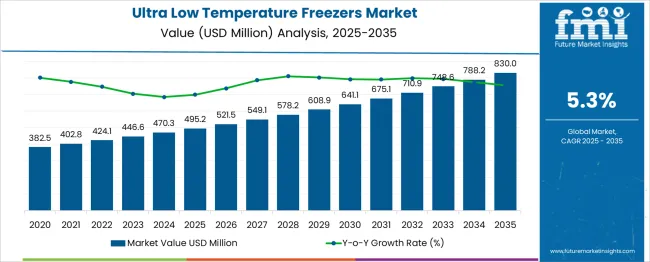
| Metric | Value |
|---|---|
| Ultra-Low Temperature Freezers Market Estimated Value in (2025 E) | USD 495.2 million |
| Ultra-Low Temperature Freezers Market Forecast Value in (2035 F) | USD 830.0 million |
| Forecast CAGR (2025 to 2035) | 5.3% |
The ultra low temperature freezers market is witnessing sustained momentum due to expanding demand in biopharmaceutical research, genetic engineering, and vaccine storage. Global investments in drug discovery and personalized medicine are accelerating freezer procurement across laboratories and biotech firms.
Regulatory emphasis on cold chain integrity and growing installation in academic and clinical research environments have enhanced the strategic importance of ultra-low temperature storage systems. As the industry shifts toward high-throughput and high-density sample preservation, manufacturers are innovating with energy-efficient, space-optimized units and IoT-enabled monitoring systems.
Furthermore, public health preparedness and biorepository development continue to receive global funding, ensuring long-term growth prospects. Demand is also being reinforced by expansion in contract research and manufacturing services that require validated, uniform sub-zero storage conditions.
The ultra-low temperature freezers market is segmented by type, application, technology, and geographic regions. The ultra-low temperature freezers market is divided into Upright freezers, Chest freezers, and other types. In terms of application, the ultra-low temperature freezers market is classified into Pharmaceuticals, Blood and blood products, Organs, Forensic and genomic research, and other applications.
The ultra-low temperature freezers market is segmented into automated and semi-automated. Regionally, the ultra-low temperature freezers industry is classified into North America, Latin America, Western Europe, Eastern Europe, Balkan & Baltic Countries, Russia & Belarus, Central Asia, East Asia, South Asia & Pacific, and the Middle East & Africa.
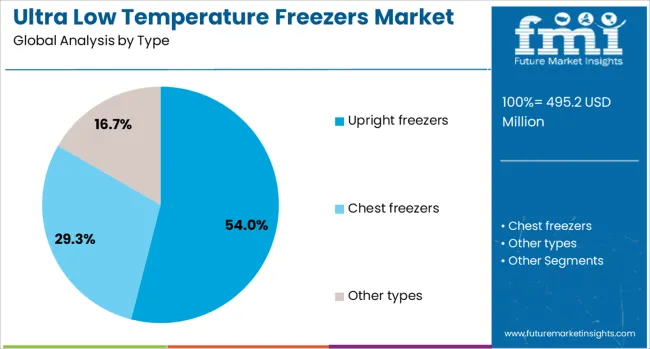
Upright freezers are projected to hold 54.0% of the total market revenue in 2025, emerging as the dominant type in the ultra low temperature freezers category. This leadership is supported by their compact footprint, vertical design efficiency, and ease of installation in constrained lab spaces.
Facilities with high sample turnover favor upright models due to their multi-shelved architecture, which allows better organization, access, and segregation of biologics. Energy optimization features and reduced maintenance requirements have further increased adoption in academic, clinical, and commercial laboratories.
Additionally, advances in insulation materials and microprocessor-based temperature controls have enhanced reliability, ensuring sample security in mission-critical applications such as vaccine storage and cellular research.
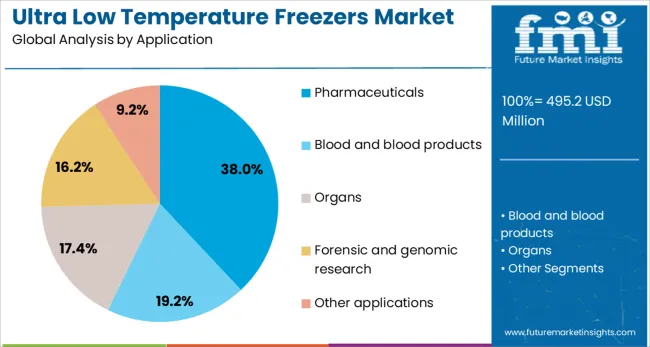
The pharmaceuticals segment is expected to contribute 38.0% of the total market share by 2025, making it the leading application area for ultra low temperature freezers. This position is driven by the increasing volume of temperature-sensitive drug formulations, biologics, and mRNA-based therapies requiring stable cold chain preservation.
Strict regulatory guidelines from authorities such as the FDA and EMA regarding biologic integrity during storage have reinforced demand from pharmaceutical manufacturers. The segment’s growth is further supported by expansion in R&D activities, clinical trials, and drug approval pipelines that require sample integrity and traceability.
Freezers equipped with real-time data logging, backup systems, and remote alerts are being increasingly deployed to meet pharma-grade compliance standards.
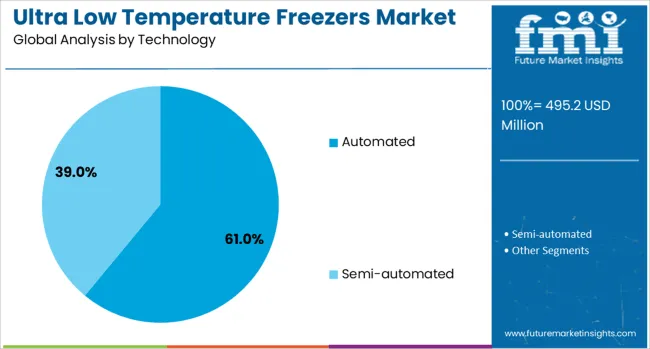
Automated systems are forecast to account for 61.0% of the market revenue share in 2025, making them the leading technology in the ultra low temperature freezer landscape. The rise in automation is being driven by the need for high-volume storage management, reduced human error, and integration into smart lab infrastructures.
These systems offer enhanced temperature stability, automated inventory management, and reduced door openings, thereby preserving energy and minimizing sample exposure. Automation also aligns with the broader trend of digital transformation across laboratories, allowing remote access and cloud-based monitoring.
Pharmaceutical, biotech, and academic labs are increasingly investing in such technologies to support scalability, data traceability, and compliance with evolving quality control protocols.
Increasing demand from industries such as healthcare, biotechnology, pharmaceuticals, and research sectors is driving growth in the ultra low temperature freezers market. These freezers, capable of maintaining temperatures as low as -80°C to -150°C, are crucial for storing sensitive biological samples, vaccines, and pharmaceuticals. The growing investments in biopharmaceutical research, vaccine development, and cryopreservation technologies are further fueling demand. Despite this, high operational costs and energy consumption remain key challenges. However, advancements in technology, coupled with the rise of personalized medicine, present significant opportunities for innovation and expansion in the market.
Demand for ultra low temperature freezers is being driven by the rapid expansion of the healthcare, biotechnology, and pharmaceutical industries. These freezers are essential for preserving temperature-sensitive biological samples, vaccines, and pharmaceuticals, particularly at temperatures between -80°C to -150°C. The need for such freezers is rising as the healthcare sector accelerates research in drug discovery, vaccine development, and gene therapy. Furthermore, the growth in biobanks and cryopreservation for storing cells, tissues, and genetic materials has led to a higher requirement for ultra-low temperature storage solutions. The increased focus on personalized medicine, as well as the rise in clinical trials and global health initiatives, further boosts demand, making ultra-low temperature freezers crucial for maintaining the integrity of sensitive biological materials in both research and clinical environments.
One of the primary challenges faced by the ultra low temperature freezers market is the high operational costs and energy consumption required to maintain ultra-low temperatures. These freezers consume significant amounts of electricity to keep temperatures as low as -80°C to -150°C, resulting in higher utility bills. This is particularly burdensome for laboratories and healthcare facilities that operate numerous units. Additionally, the initial cost of purchasing and setting up these freezers is often high, making them less accessible to smaller or budget-conscious organizations. The risk of failure in the cooling system also poses significant operational risks, as any malfunction can lead to the loss of valuable samples, causing disruptions in critical research. Regular maintenance, calibration, and compliance with stringent regulations further increase the total cost of ownership.
The ultra low temperature freezers market is presented with numerous opportunities, particularly in cryopreservation and vaccine storage. The increased focus on vaccine production and distribution, especially in light of global health challenges, has elevated the demand for reliable and precise cold storage solutions. With vaccines requiring temperatures as low as -80°C, the need for ultra-low temperature freezers has never been higher. Additionally, advancements in regenerative medicine, gene therapy, and stem cell research are driving demand for long-term, secure storage solutions for biological materials. The growing trend of personalized medicine further amplifies this demand, creating an opportunity for manufacturers to provide more advanced, energy-efficient, and cost-effective freezer models. Furthermore, biobanks and clinical trials are increasing globally, further expanding the scope for ultra-low temperature storage solutions.
Recent trends in the ultra low temperature freezers market highlight a shift towards energy-efficient models that offer lower operational costs without compromising performance. As energy prices continue to rise, manufacturers are increasingly focusing on technologies that optimize power usage and improve the sustainability of refrigeration systems. Smart monitoring systems integrated into these freezers are gaining traction, providing users with real-time temperature tracking, notifications of potential failures, and maintenance reminders. These systems enhance reliability and prevent potential losses of valuable samples. Additionally, there is a growing demand for compact, space-saving models designed for laboratories with limited space. Innovations in cooling technologies, such as the use of alternative refrigerants and more efficient compressors, are also becoming prevalent, allowing for better performance while minimizing environmental impact.
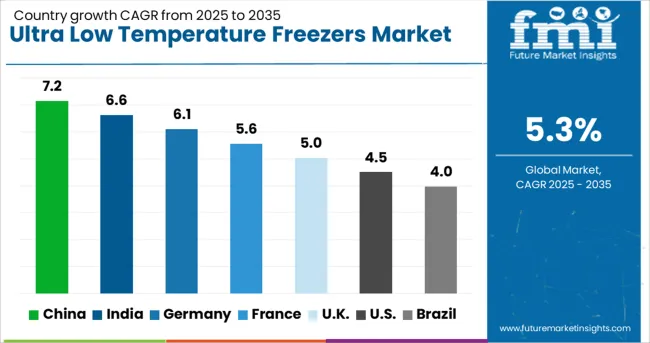
| Country | CAGR |
|---|---|
| China | 7.2% |
| India | 6.6% |
| Germany | 6.1% |
| France | 5.6% |
| UK | 5.0% |
| USA | 4.5% |
| Brazil | 4.0% |
The ultra low temperature freezers market is projected to grow at a CAGR of 5.3% from 2025 to 2035. Among the top markets, China leads at 7.2%, followed by India at 6.6%, while France posts 5.6%, the United Kingdom records 5.0%, and the United States stands at 4.5%. These growth rates reflect stronger demand in developing markets like China and India, driven by advancements in biotechnology, pharmaceuticals, and healthcare.
On the other hand, mature markets such as the USA and the UK show steady growth, primarily fueled by the need for scientific research and healthcare applications. Notably, BRICS countries like China and India are driving the majority of growth in the sector, while OECD nations such as France, the UK, and the USA represent steady, mature markets that continue to contribute to global demand.The analysis spans over 40 countries, with the leading markets detailed below.
China is expected to grow at a CAGR of 7.2% through 2035, driven by the country’s rapid expansion in life sciences, pharmaceuticals, and research industries. As the biotechnology and pharmaceutical sectors expand, demand for ultra low temperature freezers (ULT) for the storage of vaccines, biological samples, and laboratory research increases. The growth is also spurred by the rise of China’s healthcare infrastructure and the country’s increasing participation in global clinical trials. Additionally, China’s emphasis on scientific research and innovation further accelerates the adoption of ULT freezers, particularly in academic and healthcare institutions.
India is projected to grow at a CAGR of 6.6% through 2035, with demand for ultra low temperature freezers accelerating due to increased research and pharmaceutical development. India’s growing focus on biotechnology and pharmaceutical sectors, including vaccine production and biobanking, is driving the need for ULT freezers. Additionally, India's expanding healthcare sector, particularly in clinical trials and medical research, is fueling the market for ULT freezers. Government initiatives to boost research and development in the life sciences sector are likely to contribute further to market growth. The shift toward cold chain logistics for vaccines and biologics further augments demand.
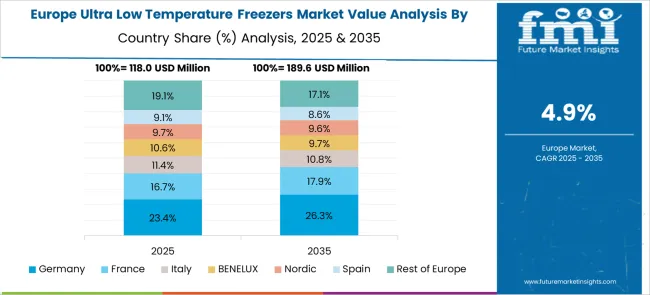
France is expected to grow at a CAGR of 5.6% through 2035, supported by the country’s strong pharmaceutical, healthcare, and research sectors. As demand for biological sample storage, vaccine preservation, and clinical research accelerates, the need for ultra low temperature freezers grows. France’s position as a hub for scientific innovation, along with its well-established pharmaceutical industry, makes it a leading market for ULT freezers in Europe. The increasing number of government-backed healthcare initiatives and growing emphasis on research and development also contribute to the rising adoption of ULT freezers across both public and private sector institutions.
The United Kingdom is projected to achieve a CAGR of 5.0% through 2035, supported by a steady rise in demand for ultra low temperature freezers in pharmaceuticals, healthcare, and research. The UK’s well-established life sciences sector, especially its leadership in clinical trials and biomedical research, is driving market demand for ULT freezers. Additionally, the growing focus on vaccine storage and the increasing prevalence of biologics in the pharmaceutical industry are key factors fueling growth. With a rising need for cryogenic storage solutions, particularly in research institutions, the market for ultra low temperature freezers in the UK is set for continuous growth.
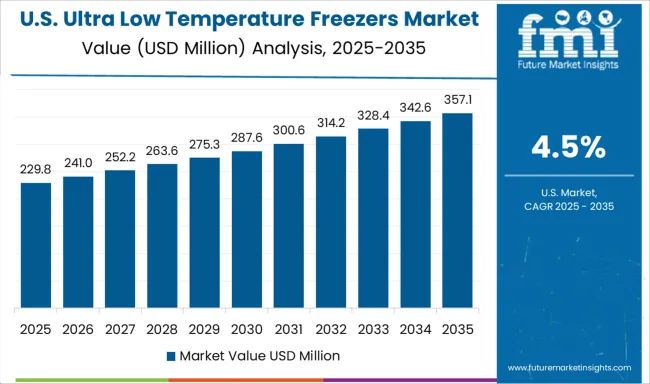
The United States is expected to grow at a CAGR of 4.5% through 2035, driven by strong demand from the pharmaceutical, biotechnology, and healthcare sectors. The USA remains the largest market for ultra low temperature freezers, as its extensive network of pharmaceutical companies, medical research centers, and hospitals require reliable and efficient cold storage solutions. Increasing advancements in drug development, vaccine distribution, and medical research are pushing the need for cryogenic storage solutions in research and commercial labs. In addition, the growth of biobanks and clinical trials further supports the need for advanced ULT freezers across the healthcare industry.
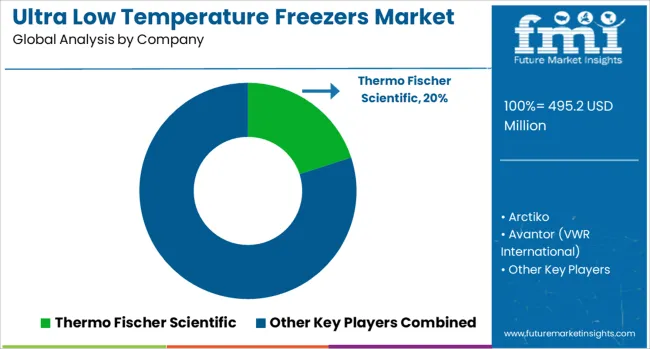
The ultra-low temperature (ULT) freezers market is dominated by key players that provide high-performance refrigeration solutions for laboratories, biopharmaceuticals, research institutions, and medical facilities. Thermo Fischer Scientific is a leader in the market, offering advanced ULT freezers known for their reliability, energy efficiency, and precision temperature control, catering to pharmaceutical and clinical research applications. Eppendorf specializes in ULT freezers with cutting-edge technology that meets stringent requirements for storing biological samples, vaccines, and genetic material.
Arctiko and Avantor (VWR International) provide a range of customizable ULT freezers for laboratory applications, focusing on energy efficiency and enhanced cooling capacity. BINDER offers high-quality, environmentally-friendly ULT freezers with optimized temperature uniformity for sensitive applications, particularly in the life sciences sector.
Azbil Corporation and CryoScientific serve niche markets by offering ULT solutions with integrated monitoring systems and safety features for biological and industrial applications. Haier Biomedical and Esco Micro offer ULT freezers with high energy efficiency and robust cooling capabilities, serving both medical and industrial markets.
Helmer Scientific, Labcold, and LabRepCo focus on compact ULT freezers for smaller-scale operations, ensuring reliability and precise temperature management. Stirling Ultracold (Global Cooling) specializes in energy-efficient, sustainable ULT freezers, leveraging Stirling engine technology for eco-friendly cooling.
Vestfrost Solutions offers highly energy-efficient models designed for large-scale storage needs in medical and research fields.Strategic priorities include advancing energy-efficient technologies, developing eco-friendly refrigerants, and enhancing digital monitoring and connectivity for remote temperature tracking.
Recent Development
| Item | Value |
|---|---|
| Quantitative Units | USD 495.2 Million |
| Type | Upright freezers, Chest freezers, and Other types |
| Application | Pharmaceuticals, Blood and blood products, Organs, Forensic and genomic research, and Other applications |
| Technology | Automated and Semi-automated |
| Regions Covered | North America, Europe, Asia-Pacific, Latin America, Middle East & Africa |
| Country Covered | United States, Canada, Germany, France, United Kingdom, China, Japan, India, Brazil, South Africa |
| Key Companies Profiled | Thermo Fischer Scientific, Arctiko, Avantor (VWR International), Azbil Corporation, BINDER, CryoScientific, Eppendorf, Esco Micro, EVERMED, Haier Biomedical, Helmer Scientific, Labcold, LabRepCo, PHC Holdings Corporation, Stirling Ultracold (Global Cooling), and Vestfrost Solutions |
| Additional Attributes | Dollar sales by freezer type (chest, upright, bench-top) and end-use segments (biopharmaceuticals, healthcare, academic research, industrial applications). Demand dynamics are driven by increased biotechnological research, the growing demand for vaccine storage, and stricter regulatory requirements in pharmaceutical and clinical research. Regional trends indicate North America and Europe as major markets due to high investment in healthcare and research infrastructure, while Asia-Pacific shows strong growth driven by expanding pharmaceutical production and medical research sectors |
The global ultra-low temperature freezers market is estimated to be valued at USD 495.2 million in 2025.
The market size for the ultra-low temperature freezers market is projected to reach USD 830.0 million by 2035.
The ultra-low temperature freezers market is expected to grow at a 5.3% CAGR between 2025 and 2035.
The key product types in ultra-low temperature freezers market are upright freezers, chest freezers and other types.
In terms of application, pharmaceuticals segment to command 38.0% share in the ultra-low temperature freezers market in 2025.






Our Research Products

The "Full Research Suite" delivers actionable market intel, deep dives on markets or technologies, so clients act faster, cut risk, and unlock growth.

The Leaderboard benchmarks and ranks top vendors, classifying them as Established Leaders, Leading Challengers, or Disruptors & Challengers.

Locates where complements amplify value and substitutes erode it, forecasting net impact by horizon

We deliver granular, decision-grade intel: market sizing, 5-year forecasts, pricing, adoption, usage, revenue, and operational KPIs—plus competitor tracking, regulation, and value chains—across 60 countries broadly.

Spot the shifts before they hit your P&L. We track inflection points, adoption curves, pricing moves, and ecosystem plays to show where demand is heading, why it is changing, and what to do next across high-growth markets and disruptive tech

Real-time reads of user behavior. We track shifting priorities, perceptions of today’s and next-gen services, and provider experience, then pace how fast tech moves from trial to adoption, blending buyer, consumer, and channel inputs with social signals (#WhySwitch, #UX).

Partner with our analyst team to build a custom report designed around your business priorities. From analysing market trends to assessing competitors or crafting bespoke datasets, we tailor insights to your needs.
Supplier Intelligence
Discovery & Profiling
Capacity & Footprint
Performance & Risk
Compliance & Governance
Commercial Readiness
Who Supplies Whom
Scorecards & Shortlists
Playbooks & Docs
Category Intelligence
Definition & Scope
Demand & Use Cases
Cost Drivers
Market Structure
Supply Chain Map
Trade & Policy
Operating Norms
Deliverables
Buyer Intelligence
Account Basics
Spend & Scope
Procurement Model
Vendor Requirements
Terms & Policies
Entry Strategy
Pain Points & Triggers
Outputs
Pricing Analysis
Benchmarks
Trends
Should-Cost
Indexation
Landed Cost
Commercial Terms
Deliverables
Brand Analysis
Positioning & Value Prop
Share & Presence
Customer Evidence
Go-to-Market
Digital & Reputation
Compliance & Trust
KPIs & Gaps
Outputs
Full Research Suite comprises of:
Market outlook & trends analysis
Interviews & case studies
Strategic recommendations
Vendor profiles & capabilities analysis
5-year forecasts
8 regions and 60+ country-level data splits
Market segment data splits
12 months of continuous data updates
DELIVERED AS:
PDF EXCEL ONLINE
Ultra-low Temperature Cooling Fan Market Size and Share Forecast Outlook 2025 to 2035
Ultra-low Temperature Air Source Heat Pump Units Market Size and Share Forecast Outlook 2025 to 2035
Ultra-Low Temperature Perfluoroelastomer Market Size and Share Forecast Outlook 2025 to 2035
Temperature Controlled Pharmaceutical Packaging Solutions Market Forecast and Outlook 2025 to 2035
Temperature Monitoring Device Market Size and Share Forecast Outlook 2025 to 2035
Temperature Controlled Vaccine Packaging Market Size and Share Forecast Outlook 2025 to 2035
Temperature and Freshness Sensors Market Size and Share Forecast Outlook 2025 to 2035
Temperature Detection Screen Market Size and Share Forecast Outlook 2025 to 2035
Temperature Loggers Market Size, Share & Forecast 2025 to 2035
Temperature Controlled Pharma Packaging Market Size, Share & Forecast 2025 to 2035
Temperature Controlled Packaging Solution Market - Size, Share, and Forecast Outlook 2025 to 2035
Temperature Transmitter Market Growth - Trends & Forecast 2025 to 2035
Market Share Breakdown of Temperature Controlled Packaging Solutions
Temperature Sensors Market Growth - Trends & Forecast 2025 to 2035
Temperature Controlled Pharmaceutical Container Market Analysis, Size, Share & Forecast 2024 to 2034
Temperature Controlled Packaging Boxes Market
Temperature Sensing Foley Catheter Market
Temperature Calibrator Market
5G Temperature-Compensated Crystal Oscillator (TCXO) Market Size and Share Forecast Outlook 2025 to 2035
Low Temperature Flexible Tester Market Size and Share Forecast Outlook 2025 to 2035

Thank you!
You will receive an email from our Business Development Manager. Please be sure to check your SPAM/JUNK folder too.
Chat With
MaRIA